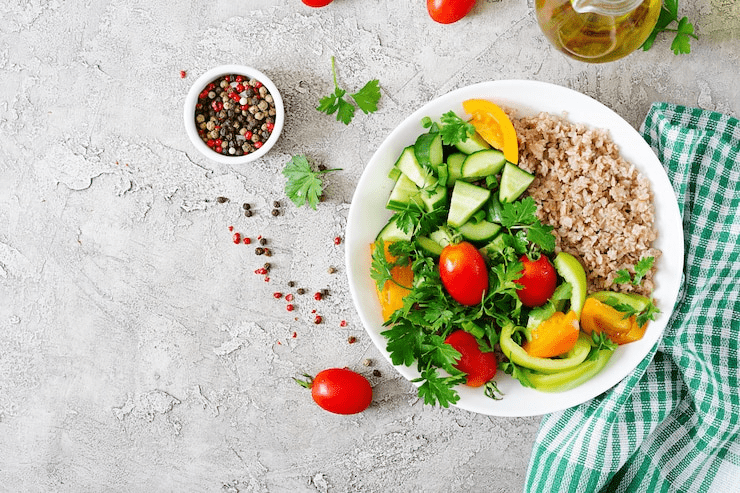Not just kids, even many adults make faces when they see vegetables on their plates. People think the vegetables are only good for salad or dressing. But in fact, vegetables are a great source of nutrition. Vegetables especially green leafy vegetables are healthy protein sources. Vegetables offer other nutrients such as fibers, vitamins and minerals.
People who struggle to get vegetables in their diet may miss out on important nutrients, especially protein. To bridge this gap, it is vital to include healthy protein supplements which can be plant-based. These vegan protein powders help to fulfill daily protein requirements along with offering other fitness benefits.
Importance of a Balance Diet
To stay active and healthy one must consume a balanced diet which covers all the major food groups. These include Protein, carbohydrates, Fats, Vitamins and Minerals. A balanced diet should reflect in every meal during the day and not just one or two.
Without a balanced diet people are vulnerable to infections, diseases, fatigue and low performance. Children who don’t eat a balanced diet may face challenges later in life. It can affect their growth and development. There are many diseases which are related to an unhealthy diet such as heart diseases, cancer, stroke and diabetes.
Importance of Vegetables in a Balance Diet
Vegetables are key to any balanced diet as they provide so many health benefits. Vegetables are a great source of essential vitamins, minerals, and antioxidants. One should include vegetables of different colors. Vegetables have a high amount of fibers which helps to improve the digestive system.
A very important benefit of including vegetables in the diet is that they are a great source of potassium. Potassium helps in nerve and muscle function. Vegetables such as sweet potatoes, carrots, and bell peppers are an excellent source of vitamin A. Vitamin A helps to boost immune system, eye and vision health, and skin and hair health.
The most important nutrient that should be there in every meal in some quantity is protein. Protein helps the body in so many ways that it just cannot be ignored. Many people have this misconception that only meat is a rich source of protein and vegetables cannot provide enough protein. That is widely inaccurate. Consuming vegetables can give you a high-quality and adequate amount of protein. It is important to include protein in your diet.
High Protein Vegetable Sources for a Balanced Diet
Vegetables that contain most protein are broccoli, spinach, asparagus, artichokes, potatoes, sweet potatoes, and Brussel Sprouts, which typically contain 4–5 grams of protein per cooked cup (approx. 200g). Here are some other vegetables which are healthy protein sources and should be a part of a balanced diet:
· Lentils – lentils are a good source of protein and can be used in a variety of dishes. 200g of lentils can provide up to 18g of protein. Lentils are also a great source of fiber.
· Beans – beans are a part of staple diet across many cultures. Most common beans include Kidney, black, and pinto. Most beans contain around 15g of protein per 200g. Beans are also an excellent source of complex carbs, fiber, iron, folate, phosphorus, potassium, manganese, and several beneficial plant compounds.
· Hemp Seed – hemp seeds contain 9g of protein in around 30g. Which makes them beneficial in dishes such as smoothie or breakfast musali. They can also be used in salad dressings, granola, or protein bars.
· Yellow Peas – yellow peas are fantastic for providing high-quality and easy-to-digest protein. Yellow peas provide 9g of protein per 30g. It is widely used in vegan protein powders.
· Brown Rice – along with protein brown rice also provide high-fiber bran, and carbohydrate-rich endosperm. Brown rice provides 5g of protein per 30g. Combination of pea and brown rice is considered as a complete protein.
Benefits of Plant Protein
· Easy Absorption – Plant protein aids indigestion without causing any bloating because it is easy to absorb. It provides amino acids that help with protein synthesis. Because plant protein is quick to absorb it also helps to improve gut health.
· Aids in Muscle Growth – Plant protein helps to restore muscle cells thus helping the body to grow muscles. Plant protein is especially helpful for athletes who want to recover from intensive training.
· Helps with satiety – Because plant proteins are tightly packed structure it takes longer to digest. This helps to keep you fuller and consume less calories.
· Improves cognitive function – Plant protein is not just a good source of protein but it also contains vital nutrients such as vitamin B, phosphorus, manganese, etc. These vitamins and minerals are crucial for the body’s cognitive health.
· Reduces Cholesterol – Unlike animal-based protein, plant protein helps to reduce cholesterol. Because plant-protein is purer than animal-protein it also helps to improve heart health. Vegetables which are healthy protein sources should be included in a balanced diet. A vegetable salad is the best food to incorporate different vegetables. A vegetable rich diet is a diet filled with goodness and nutrition.



